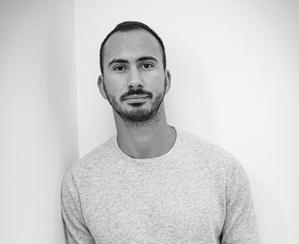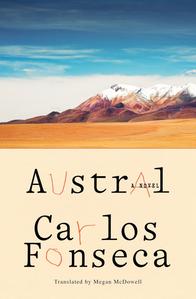
|
|
| photo: Rodrigo Ruiz | |
Carlos Fonseca was born in Costa Rica in 1987, brought up in Puerto Rico, and studied in the U.S. He was selected by the Hay Festival as part of the Bogotá39 group (2017), by Granta magazine as one of its 25 best young Spanish-language novelists (2021), and by Encyclopaedia Britannica as one of the 20 most promising writers in the world for its "Young Shapers of the Future" (2022). His previous novels are Colonel Lágrimas and Natural History, both translated by Megan McDowell. Austral (Farrar, Straus and Giroux), also translated by McDowell, is a novel about legacy, memory, and the desire to know and be known. Fonseca teaches at Cambridge University, where he is a fellow of Trinity College.
Handsell readers your book in 25 words or less:
Austral is a book about endings and beginnings. A book about what lies beyond the apparent ends we find: of languages, of cultures, of life.
On your nightstand now:
Right now I am rereading one of my favorite novels: Marta Aponte Alsina's La muerte feliz de William Carlos Williams. Aponte is a wonderful author, and her retelling of the story of William Carlos William's Puerto Rican mother, Raquel, is simply wonderful. I am also reading a lot of books with monologues in them, trying to understand how some of my preferred authors work the genre.
Favorite book when you were a child:
I loved Jules Verne's Around the World in Eighty Days. I loved that sense of adventure, and the idea of a journey that spans the world.
Your top five authors:
Of William Faulkner one could say what he said of Thomas Wolfe: his ambition led him to fail in the most magnificent way possible. After Faulkner, I would place W.G. Sebald: he gave us a new way to look both at history and nature. Then perhaps the works of the Argentine Jorge Luis Borges: he made possible to think of literature as conceptual art. The Brazilian author Clarice Lispector, on the other hand, showed me that writing can be everything: even happiness. She is the writer of ecstasy. And lastly, I would include a poet, César Vallejo, who perhaps got closer than anyone to expressing pain.
Book you've faked reading:
I didn't so much fake reading it, but something interesting happened with what would soon become my favorite book: Faulkner's Absalom, Absalom! I must have run into it when I was about 20 years old, struggling to perfect my English. I tried a couple of times to read it but failed: couldn't get past the middle. But I nonetheless knew the book was special, so I started saying it was my favorite book, which it was. I just hadn't quite finished it yet.
 Book you're an evangelist for:
Book you're an evangelist for:
If there is one book, then it would be precisely Faulkner's Absalom, Absalom! It is just at another level.
Book you've bought for the cover:
I vividly remember encountering, when I was 21 in 2008, the FSG translation of Roberto Bolaño's 2666. It was a beautiful boxed set containing three books, and the cover was such a wonderful baroque mixture of religious iconography, natural history, and playful doodling that I was immediately driven to this Latin American writer whose name, surprisingly, I hadn't encountered yet.
Book you hid from your parents:
When I was an adolescent, I used to hide the books that I felt were too close to what I was writing at the time. A silly way of perhaps hiding from myself the evident plagiarism of those early writing attempts.
Book that changed your life:
I will always remember finding, in my go-to bookshop in Puerto Rico, a copy of Clarice Lispector's The Hour of the Star. Opening that book was a game changer; it showed that literature could be so much more than just telling stories.
Favorite line from a book:
I have always loved Vardaman's "My mother is a fish" in As I Lay Dying. I love how by itself it is a nonsensical, ugly phrase, but within the context of the novel, Faulkner is able to transform it into such a powerful expression of grief.
Five books you'll never part with:
I think Julio Cortázar's Hopscotch will always be dear for me. The same for Juan Rulfo's masterpiece novella, Pedro Páramo, and Marguerite Duras's Blue Eyes, Black Hair. I take Anne Carson's beautiful book-artifact, Nox, everywhere I go. And lastly, I like to keep a copy of Sebald's Austerlitz close by.
Book you most want to read again for the first time:
I wish I could go back to that moment of absolute innocence in which I first encountered Kafka's books. I wish I could return to that moment of absolute magic in which you encounter something unexpected, something fascinating and strange that nonetheless seems to work just perfectly.

